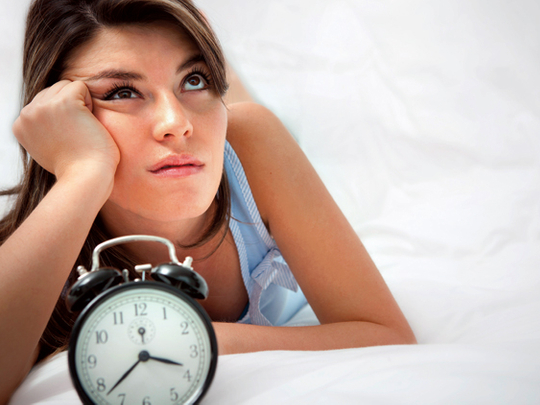
"Big question that one," replies Dr Luci Wiggs when asked, "When is it time to visit the sleep doc?" Dr Wiggs, a sleep expert and senior lecturer in psychology at Oxford Brookes University in the UK, explains that there are more than 80 recognised sleep disorders.
She adds that a serious condition like insomnia is sometimes considered fashionable and accepted as a lifestyle ‘accessory', and apnoea, a breathing disorder, is confused with regular snoring.
Worldwide millions of people suffer from lack of sleep. The American Hospital in Dubai even has a Sleep Centre, a facility dedicated to patients suffering from sleep disorders. The Hospital says that these disorders affect infants, children and adults alike and can lead to significant health problems and reduced quality of life.
At the recent Golden Sleep Academy event organised by Pampers in Dubai, Dr Wiggs was one of the sleep specialists who shared their insights on the effects of sleep disruption.
Dr Wiggs says that there are many questions regarding sleep and only some have straightforward answers. "Then there are the ‘yes and no' kind of explanations. Take the question of quantity versus quality. The answer can vary from person to person, depending on age, lifestyle and medical history," she says.
1. Is quality or quantity more important?
Both factors are important. People should focus on more than just counting the hours. For instance, if you wake up twice at night, you won't feel as rested compared to a night when you sleep through. Quality has to do with continuity of sleep and hours of sleep. The number of hours needed per person varies. Some function well with five to six hours, others need up to nine to feel rested.
The time of sleep is also important. Take the case of shift work. If you work night shifts and sleep during the day, you might be getting the correct number of hours, but daytime sleep might be incompatible with your body clock and likely to be disrupted by outside noise. This might result in sleep that isn't restorative enough. When judging sleep, consider these factors.
2. Can excess sleep make you tired?
There is some evidence of this. It is a condition called sleep inertia, commonly associated with abrupt awakenings. It results in disorientation and temporary grogginess. Say you're sound asleep and a fire alarm goes off in the middle of the night, waking you up. You'd wake up disorientated. The same is the case when you wake up after extra hours of sleep. The effects of sleep inertia can last for 10-15 minutes or even up to an hour. If you suffer from these symptoms regularly, visit a doctor for diagnosis and treatment.
3. Can you catch upon lost sleep over the weekend?
It depends. Lots of people probably make up 30-40 per cent of their lost sleep over the weekend. If you are sleep deprived during the working week, you can catch up on sleep over the weekend. However, sleeping in late on a weekend has a downside: if you stay up late on weekends and end up sleeping in later than usual, you may not be able to fall asleep on time the night before the start of the working week. Your body clock shifts and you start the week sleep deprived. To avoid sleep deprivation, you should go to bed as well as wake up at the same time.
The effects of sleep loss are cumulative. If you're losing sleep night after night, you're going to see a gradual decrease in performance. You won't be able to concentrate as well or react as quickly.
4. Are some people naturally predisposed to waking up or falling asleep early or late?
Yes. Larks (morning people) go to bed and wake up early whereas owls (night people) prefer to stay up late and wake up late. Genetically, women are more likely to be larks, and men, owls. There is also genetic predisposition for sleeping at certain times of the day, affecting one's peak performance periods. In most cases, you can adapt your circadian clock or internal body clock to the routines of everyday life.
5. Is the remedy for fatigue always to sleep more?
First, you need to answer, "What is fatigue?" Medically it is defined as extreme physical and/or mental exhaustion that can be triggered by stress, medication, overwork or mental and physical illness or disease. Fatigue isn't necessarily associated with sleepiness. Or ask yourself, are you tired as well as sleepy? Answer these questions before identifying sleep as the solution. If you're tired, sleep might help as a form of rest and escape. Sleep might also be helpful if you're stressed. But if it's physical or mental fatigue without signs of sleepiness, you need to ease up a bit and stop pushing yourself. Seek help if this is the case.
6. Can a short power nap recharge a sleep-deprived person?
A nap, though helpful, isn't the solution. One could argue that a nap is better than no sleep. True. It can keep you going for a little longer after which you will need proper sleep. Think of it as sleep debt that builds up, and your body will want this debt to be repaid.
Research in this field shows that when sleepy drivers pulled over, took a nap, and continued their journey, they were able to function better. It is also advised that before taking a nap of 15 to 20 minutes, you should drink a cup of coffee. The reason for this is that it takes about 15 minutes for the caffeine to kick in, so once you are up, it would have started taking effect, helping you stay alert for a few hours.
7. Is it OK to exercise close to bedtime?
Any form of intense cardiovascular activity raises the body temperature, adrenaline and other hormones. You'll be too alert to sleep so it's better to cool down after exercise and give your body a few hours to return to normal before going to bed. But being active during the day is good. Regular exercise has a positive effect - releasing feel-good endorphins and enhancing mood.
Common sleep disorders
- Obstructive Sleep Apnoea (OSA) is intermittent upper airway collapse, resulting in irregular breathing during sleep.
- Narcolepsy causes patients to become so sleepy that they find it difficult to stay awake for normal daytime functioning.
- Insomnia is the inability to fall asleep or stay asleep. If it persists for longer than two weeks, it could be a serious problem.
Information courtesy: Sleep Centre, American Hospital, Dubai











